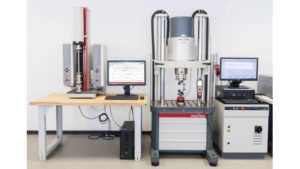New Products for Testing Plastics
Zwick is concentrating its activities in the plastics field through its own competence center. The “Plastics Testing Initiative” has been underway for two years. The range of products for testing plastics is being systematically expanded within the framework of this initiative.
Helmut Fahrenholz, who heads the competence center, is expecting the plastics market to continue its strong development. “The particular material characteristics, numerous design possibilities, and cost-effective processing continually allow new product innovations which are not possible using other materials. Material characterization plays an important role in development as well as quality assurance. Examples of promising markets are the construction industry, along with electronics, automotive, packaging, and medical technology.”
As Zwick is already strongly established in the plastics industry with its static testing systems, the goal of the initiative is to further expand the product range. Zwick will now cover the measurement of mechanical characteristics as shown in the single-point data standard ISO 10350. Testers will carry out static, creep, pendulum impact, multiaxial impact, and high speed tests, as well as tests using melt flow plastometers, hardness testers and HDT / Vicat machines.
The Mflow (Modular Flow) is a plastometer which in its basic version covers all tests in accordance with process A (MFR determination) of the ISO and ASTM standards. By adding a displacement sensor, the Mflow can be upgraded to measure the MVR in accordance with method B. An optional weight lift unit allows the machine to be operated entirely automatically. A significant advantage of the machine is the constant temperature in the extrusion barrel, which meets the requirements of the draft ISO / CD 1133-2 standard (moisture sensitive and time-dependent materials). The Adaptive Parameter Configuration (APC) system is a unique innovation which enables the tester to automatically select test parameters to optimize measurement precision. The automatic detection and elimination of the effects of air bubbles in the material guarantees reliable and meaningful results.
Zwick introduced new HIT series of pendulum impact testers in 2006 with impact energy ranges of 5.5 Joule, 25J, and 50J, and has already been very successful in the global market. A new compact 5J ISO machine with an extremely compact construction has been developed for Charpy and tensile impact testing. This is achieved by using short ISO pendulum hammers and restricting the measurement range. The tester possesses the same advantages as the larger machines and uses the low-vibration, double-rod carbon pendulum, which features very high rigidity in the impact direction and a high concentration of the mass at the point of impact. The automatic pendulum recognition (APR) system means that the test results are traceable even if different pendulums are used. Additional advantages are the slip-proof tool fixtures with dovetail guides and a convenient USB interface for connecting to the testXpert® II software.
Zwick recently introduced its new HIT 230F instrumented falling / drop weight impact tester for multi-axial impact tests and pre-damaging for compression-after-impact tests.
This machine is optimized especially for tests in accordance with ISO 6603-2 and ASTM D3763. The drop impact tester is equipped with a low-noise characteristic piezo force transducer. An innovative pneumatic specimen clamping system allows the insertion and impacting of specimens in less than five seconds and in many applications it is possible to avoid the installation of an expensive temperature chamber. The testing area is outside of the protective shielding and is easily accessible by the operator but still optimally secured.



